Sukanya Verma in Mumbai
What extreme repercussions can scorn and envy lead to are dramatically depicted in Sushil Majumdar's Lal Patthar starring Raaj Kumar, Hema Malini, Raakhee and Vinod Mehra.
Through its intriguing narrative, which unravels like pages of a voluminous novel, Majumdar examines the nature of expectations and insecurities that nagged relationships long before the emergence of independent India or a modern, self-assured woman.
The 1971 hit is a faithful remake of Majumdar's Bengali film, Lal Pathore (also written by Prasanta Chowdhary) featuring Uttam Kumar, which came out six years earlier.
The black and white original, while nowhere as opulent as its adaptation, is extremely engaging, restrained and slightly more spelled out. At the same, its Hindi version scores in creating an enigmatic ambiance, vibrant visuals and baring the darkness of its protagonists concealed by an elegant exterior.
Lal Patthar trails back somewhere presumably in the 1930s, in colonial times when the prevalence of decadent royalty, rampant belief in cursed clans, plight of poverty-stuck women married off to men twice their age, exploitation of young widows, tradition of child marriages dominated most of its history and literature.
Though predominantly set in West Bengal, the title here refers to the red bricks at Agra's historical landmark, Fatehpur Sikri, which acts as the majestic venue, tragic metaphor and startled spectator of Lal Patthar's curious beginning, significant realisations and sinister third act.
Complex character
Image: Raaj Kumar and Hema Malini in Lal PattharTroubled by a curse that runs in the family resulting in a lineage of mad ancestors, Raaj Kumar's Kumar Bahadur Gyan Shankar Rai resolves to never get married even if that means giving up on the title of King (Raja Bahadur).
Right from the beginning, Lal Patthar establishes Rai into a fascinating figure. He's not someone you are likely to grow fond of but the dynamic greys he exudes make him an ideal subject for irresistible dissection.
He dubs himself as someone who 'grew up to be a complex character' attributing to his parents' contradicting temperament -- father's a typical tyrant, mother brims with compassion. And so on one hand, he harbours great interest in books, poetry and classical music. On the other, he embraces the self-indulgent ideals of his forefathers -- nautch girls, hunting tigers, smoking cigars and gulping whisky.
A post graduate in psychology and history, his fascination with Fatehpur Sikri is gently underlined when he's found reading a book on the same or how it's his favoured destination to share with both his distinctly different companions (Hema Malini, Raakhee).
His relationship with these two women -- the mistress and the wife, the guilt of wronging both and its devastating aftermath -- is ably conveyed by Raaj Kumar who lends Rai a judicious blend of charisma, quirk, desperation, arrogance and edginess. Not to forget, THE dialogue delivery.
The wife and the mistress
Image: Hema Malini, Raaj Kumar, Rakhee in Lal PattharIn the constantly hooking proceedings of Lal Patthar, Raaj Kumar quotes a few verses from Harivanshrai Bachchan's Madhushala, ' Is paar priye, tum ho, madhu hai, us paar najaane kya hoga?' and promptly rechristens Hema Malini's Saudamini to Madhuri, the beautiful village widow he rescued from dacoits and unkind in-laws.
His attraction to Madhuri appears to be triggered by obvious lust and a sense of loneliness since he's vowed off marriage. She's understandably pleased about leaving her pitiable existence in a cowshed and playing 'Maalkin' in a princely mansion.
Complications arise in this mutually-benefiting, so-called no-strings attached relationship when expectations surface.
He wants to play Professor Higgins (in the Bengali version, Rai mentions the inspiration out aloud) to his disinclined Eliza (some hilarious moments follow, just like they did with Amitabh Bachchan in Yaarana) and is completely put off when she takes too long (according to him) to transform herself from a paan-chewing Mowgli to a picture of aristocratic grace and refinement.
Meanwhile, Madhuri realises her needs only when she loses her undefined social status, 10 long years later, to Rai's impulsive whim and sudden realisation of how quickly time has passed by with someone he's grown bored of. So he goes back on his oath and buys himself a bride in the much younger and decidedly more sophisticated Sumita (Raakhee) from her drunkard father (director Majumdar is effective in a small role).
But it's his explanation behind this action, 'Sheesha toot jaaye toh phir jud nahi sakta usse badal dena padta hai,' which exposes Rai as the jerk (no matter how articulate) he really is.
Bruised tigress
Image: Hema Malini in Lal PattharInterestingly, earlier when he asks Madhuri if she has any problem with his marriage, she is too proud and (dismissive) to admit in affirmative. When the possibility becomes a reality, she feels betrayed, demoralised and discarded after investing her all in a relationship that brought her riches but no respectability.
Using Raakhee's past connection with her Germany-returned neighbour Shekhar (Vinod Mehra) to manufacture devious schemes, she turns into a bruised tigress, also symbolically planted in her chamber, hell-bent on bringing marital gloom for her offender and his docile better half.
While Rai struggles between the women -- his huntsman mindset pictures one as a tigress, another a lamb -- and their domestic politics as does his increasing reliance on alcohol, mounting suspicions about his wife's friendship with another man lead him on a path to ruin against Nabendu Ghosh's mesmerising, thrilling screenplay.
It's strange that Hema Malini's role here is categorised as negative considering she's just being human about the whole situation. The whole 'apna ghar todkar doosre ka ghar basaon,' is not magnanimous, it's ridiculous.
Lal Patthar, itself, doesn't draw any judgement on her. She's simply a strong woman dictated by her passionate, possessive heart not the diktats of society or its norms. So even if the climax perceives her as weak, I'd like to believe its Madhuri's unconditional affection not any moral obligation that compels her to stand by her man.

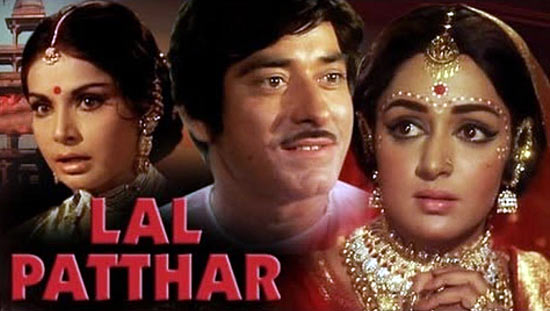
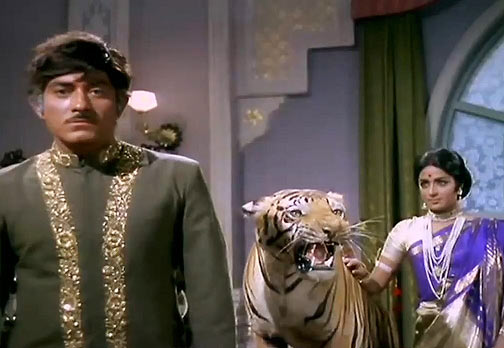
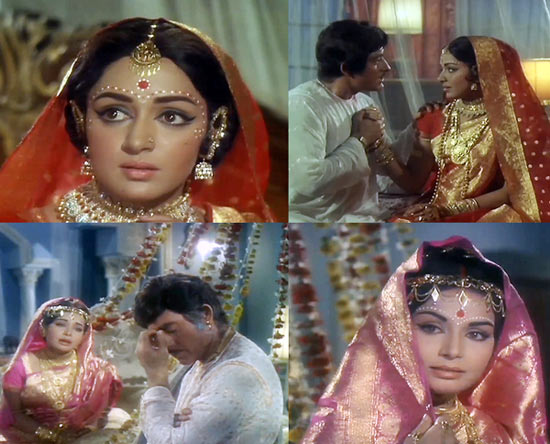
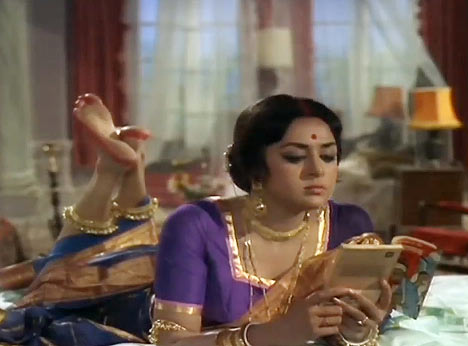
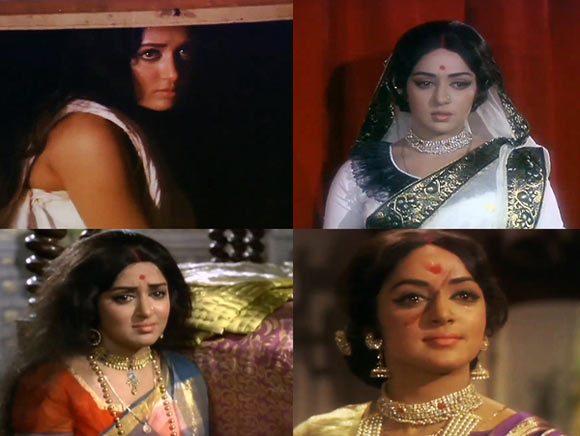
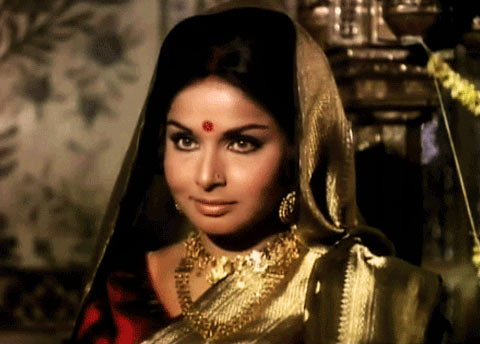
Comment
article